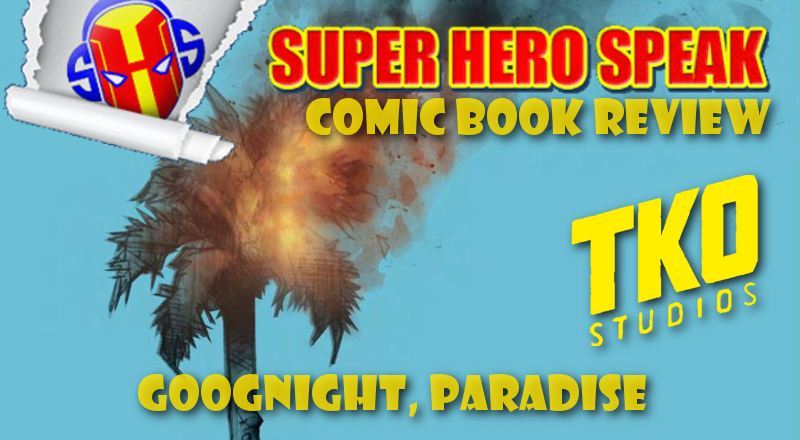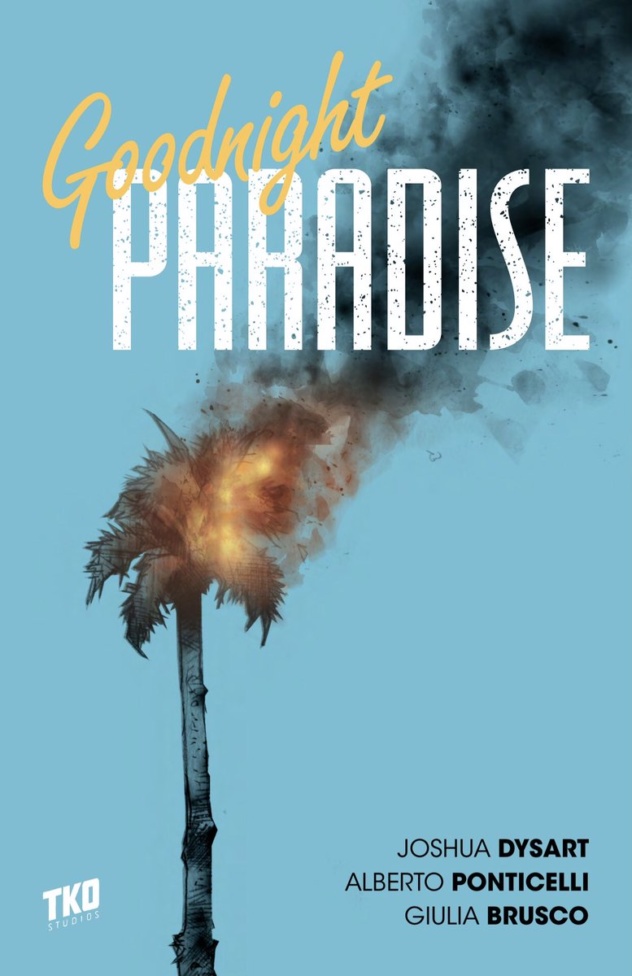Super Hero Speak
A podcast for true comic book fans
A podcast for true comic book fans

| Goodnight, Paradise
Written by Joshua Dysart |
 |
Not long ago there was a notion that comic book storytelling was best suited for tales of science fiction and fantasy. The medium just didn’t fit the real world. It was perceived to be too juvenile to host the mature and compelling stories that existed around its readers. The debate over whether or not comics even constitute a healthy outlet of reading and writing has continued from then until now. Fortunately as the generations who first consumed popular comics have grown older, they’ve been able to educate many of those who otherwise may have been skeptical. The medium is unique in its approach to visual and literary storytelling, serving as a hybrid between the flash and flare of a bright and engaging television show and the depth of psychological engagement which all great novels have. The perception surrounding comic books is changing. TKO STUDIOS, the publisher behind Goodnight, Paradise, is changing that perception even more. Paradise specifically has reached its hands into the grime of reality and pulled from that murk a captivating and thought-provoking narrative. This is the real world on
every page. This is an excellent comic.
From the very beginning the illustrations of Alberto Ponticelli and the colors of Giulia Brusco eloquently paint the serene landscape of Venice Beach, California even as forest fires are seen raging just beyond the sands. That fire is the frame which allows the reader to quickly fixate upon this world and to experience it as one of the beach’s very own citizens. Those beautiful layers of sand are blown back by a seaward wind and a dark stain is soon revealed beneath. Venice Beach is a living world of its very own, with its own social ladders, economic struggles, cultural histories and secrets. The setting can be felt. The sun is bright and hot as the skin of the local homeless are tanned and blistered beneath it. The ocean on the other hand is cool and forgiving. It erases the misery of those trapped in Venice Beach, if just for the few moments that they’re allowed to bask in the waves. Even as the world of Goodnight, Paradise grows increasingly bleak for the souls of those who have wandered there, that ocean and the freedom it represents makes the existence of the troubled cast all the more relatable.
Eddie Quinones is the lead of Goodnight, Paradise. He’s a troubled member of the homeless, a failed father desperate to rekindle the relationship with his son, and a man who aspires to do right by those around him. He’s the stranger passed by on each corner as he keeps his head down and tries to satisfy an addiction that he can’t shake. He’s a starved character in a gaunt reality and the efforts of Ponticelli and Brusco elevate that. The hunger, the sickness and the disorientation can be seen in the eyes of those who occupy Quinones’ life. On Venice Beach the homeless are chasing happiness. They’re chasing opportunity. They however, like their real world counterparts, lack the aid and the understanding which they deserve. It’s a grim life that Eddie leads, even if he makes the best of it. Goodnight, Paradise doesn’t shy away from the hard moments. Eddie gasps in relief as he finally empties his clogged bowels just outside someone’s home. He laughs as his crazed friend barks unintelligible warnings at everyone who passes them by. He becomes haunted as he eventually discovers the corpse of a young girl in a dumpster as he’s searching for food, and becomes propelled into the primary conflict of Paradise.
Joshua Dysart tackles the challenges faced by Eddie and by his community with an unflinching expertise. Goodnight, Paradise could have easily succumbed to the unpleasantness of its reality and felt like a trudge through heavy waters. Dysart instead allows for his readers to first develop empathy and understanding of the environment. There are moments when Quinones can only bring himself to observe, much like Dante as he navigated the circles of Hell. His frightened state of awe allows for appreciation to be bred. When the oftentimes desolate circumstances rise to the top of the narrative, the sincerity of each character makes their fate seem important. Readers hope that Eddie survives this ordeal and is able to mend the bridge between himself and his family. They hope that the youngest members of Venice Beach are able to free themselves from the cycle of violence which has overtaken the region. These young faces, each from different backgrounds and enduring their own unique demons, carry just as much magnitude in their expressions and in their speech. Their decisions unveil each layer of Paradise’s murder mystery and their actions pave a path for Quinones to follow. On that path he delves into the past and into the future of Venice Beach. It isn’t until the last page that the future becomes clear, as if the smoke on the horizon has finally cleared and allowed Eddie to look ahead. “Tomorrow is for the living,” he repeats.
Goodnight, Paradise is a mesmerizing journey through a downcast world. As the book is closed, the strength which comes through community, through generosity and decency, is realized. The fate of those ignored, those left alone to face their mountainous hardships, is painful and unignorable. Joshua Dysart, Alberto Ponticelli and Giulia Brusco have crafted something special. This is an unwavering and mature narrative, unafraid to face the ugliest parts of our reality, and it could have only existed as a comic. Watching Venice Beach go up in the flames of a fever dream is a sequence that will be burned into its readers. Paradise gazes into the eyes of its burdened cast until the reflection of hope and the reflection of the sea can be seen within them. If the fates of these people are something that a reader might want to change, they need only to stop and help that stranger begging on the corner as he tries to satisfy an
addiction that he can’t shake on his own.
Final Score: 9 out of 10 capes